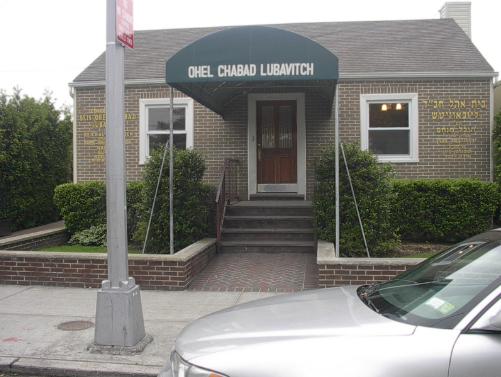
Photo of Congregation Ohel Chabad Lubavitch-owned property located at 226-10 Francis Lewis Boulevard, Queens. Image Courtesy of Abba Refson.
BSA approval contingent upon several conditions, and restrictions of the hours of operation and access to gravesites. The Congregation Ohel Chabad Lubavitch owns the property at 226-10 Francis Lewis Boulevard, Queens adjacent to the Montefiore Cemetery where the Lubavitch spiritual leader Rebbe Menachem M. Schneerson and his predecessor Rebbe Yosef J. Schneerson are buried. Daily visitors numbering in the several hundreds use the property to access the graves of the Lubavitch leaders. In 1994 the Congregation purchased the property which comprises five adjacent buildings used by the visitors as a synagogue sanctuary and 24-hour per day access point to the gravesite.
The Congregation applied to the Board of Standards and Appeals for a variance to allow it to legalize and enlarge a synagogue and accessory uses at the property, and to waive the FAR, lot coverage, yard, and parking requirements. The Congregation’s initial application proposed to merge the five homes and legalize the operation of the synagogue and visitor’s center, while also providing accessory uses to visitors including synagogue services, prayer space, and a Shabbos house with overnight transient sleeping accommodations. The Congregation also proposed to connect the cellar, first story, and second story of the five homes, thereby increasing the FAR and lot coverage, and decreasing rear and side yards and parking space requirements, contrary to the existing R2A zoning regulations.
Queens Community Board 13, local City Councilman Leroy Comrie, New York State Assemblywoman Barbara Clark, and the Cambria Heights Civic Association all opposed the variance for the synagogue and visitor’s center, citing concerns about the Congregation’s garbage and litter, visitors’ lack of consideration for the neighbors, the Shabbos house sleeping accommodations, and increased traffic and parking needs.
Heeding the concerns of the community and elected officials, the BSA asked the Congregation to revise its proposal and address excessive bus idling and traffic, poor maintenance of the property, 24-hour use, and other issues. In response, the Congregation agreed to limit overnight sleeping accommodations (Fridays and special holidays) to 65 days a year, reduce the number of Shabbos house beds from 52 to 34, and agreed to ask the Department of Transportation to establish a no-parking zone in front of the property.
The Congregation was unwilling to limit access to the Rebbe’s grave to less than 24-hours per day, claiming that prohibiting access would interfere with the Congregation’s right to perform religious ceremonies. In an attempt to remedy the BSA’s concerns, the Congregation proposed constructing a partition wall at the side yard entrance to partially obstruct visitors between 12:00 a.m. and 6:00 a.m. daily, and provide posts on its website that access to the gravesite would be limited during those hours. The BSA ruled, however, that complete cessation of operations and access to the property for some portion of the day was necessary and restricted the Congregation’s operation hours and gravesite accessibility to 6:00 a.m. to 10:00 p.m. daily.
The BSA granted the Congregation’s variance application, but insisted that the Congregation comply with a number of conditions. In addition to imposing restrictions on the Congregation’s hours of operation and access to the gravesites, the BSA also required that the Congregation post signs restricting loitering, littering, and trespassing on neighbors property; limit idling of cars and buses in front of the property to no more than one minute; store garbage inside; and provide private garbage pickups on event days. The BSA also attached a 10-year term to the variance, anticipating a future review of the functionality of the Congregation and appropriateness of the imposed conditions.
BSA: 226-10 Francis Lewis Boulevard, Queens (35-11-BZ) (October 22, 2013) (Law Office of Frederick A. Becker, for Congregation Ohel Chabad Lubavitch).
By: Eric Knowles (Eric is currently a Third Year Law Student at New York Law School)


Any restriction to full and total access to the grave site is a violation of the First Amendment Right to Freedom of Religion.
It is time to file a class action law suit against the BSA to demand full and total access 24 hours/6 days a week to this site.